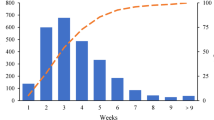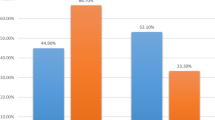Abstract
Objective
To evaluate the 10-year curative effects of short-term intensive neoadjuvant chemotherapy for operable breast cancer.
Methods
A total of 510 patients with stagell and operable stagelll breast cancer were divided into group A (preoperative neoadjuvant chemotherapy 251 cases) and group B (postoperative adjuvant chemotherapy 259 cases). The patients in group A received short -term and intensive neoadjuvant chemotherapy for 4 weeks followed by modified radical mastectomy two weeks after the chemotherapy. The postoperative adjuvant chemotherapy began within two weeks after surgery. The same chemotherapeutic regimen was used for both groups.
Results
For stage III in group A the 5-year overall survival rate (OS) and disease-free survival rate (DFS) were 59.2% and 54.9% respectively which were higher than those in group B (28.3% and 20.8% respectively,P<0.05). The 10-year OS and DFS were 78.1% and 73.5% respectively for stage II in group A which were higher than those in group B (68.4% and 60.7%,P< 0.05). The 10-year OS and DFS were 42.3% and 40.4% respectively for stage III in group A which were higher than those in group B (20.4% and 18.4% respectively,P<0.05).
Conclusion
The results showed that intensive neoadjuvant chemotherapy can improve the 10-year survival for patients with stage II and operable stage III breast cancer.
Similar content being viewed by others
References
Quiet CA. Ferguson DJ. Weichselbaum RR. et al. Natural history of node-negative breast cancer: A study of 826 patients with long-term follow-up. J Clin Oncol, 1995;13: 1144.
Zhang B, Cha YE, Zhang Q, et al. Combination therapy of locally advanced breast cancer. Chinese Journal of Clinical Oncology, 1997;24:138.
Fisher B, Anderson S, Wickerham D, et al. Increased intensification and total dose of cyclophosphamide in a doxorubicin-cyclophophamide regimen for the treatment of primary breast cancer: findings from National Surgical Adjuvant Breast and Bowel Project B-22. J Clin Oncol, 1997; 15:1858.
Fisher B, Anderson S, DeCillis A, et al. Further evaluation of intensified and increased total dose of cyclophophamide for the treatment of primary breast cancer: findings from National Surgical Adjuvant Breast and Bowel Project B-25. J Clin Oncol, 1999;17:3374.
Henderson IC, Berry DA, Demetri GD, et al. Improved outcomes from adding sequential paclitaxel but not from escalating doxorubicin dose in an adjuvant chemotherapy regimen for patients with node-positive primary breast cancer. J Clin Oncol, 2003;21:976.
Estevez LG, Cuevas JM, Anton A, et al. Weekly docetaxel as neoadjuvant chemotherapy for stage and breast cancer: efficacy and correlation with biological marker in a phase, multicenter study. Clin Cancer Res, 2003;9:686.
Jackisch C, von Minckwitz G, Eidtmann H, et al. Dose — dense biweekly doxorubicin/docetaxel versus sequential neoadjuvant chemotherapy with doxorubicin/cyclophos-phamide/docetaxel in operable breast cancer: second interim analysis. Clin Breast Cancer, 2002;3:276.
Harris EE, Schultz D, Bertsch H, et al. Ten-year outcome after combined modality therapy for inflammatory breast cancer. Int J Radiat Oncol Biol Phys, 2003;55:1200.
Cance WG, Carey LA, Calvo BF, et al. Long-term outcome of neoadjuvant therapy for locally advanced breast carcinoma: effective clinical downstaging allows breast preservation and predicts outstanding local control and survival. Ann Surg, 2002; 236:295.
Stebbing J J, Gaya A. The evidence-based use of induction chemotherapy in breast cancer. Breast Cancer, 2001; 8:23.
Buchholz TA, Hunt KK, Whitman GJ, et al. Neoadjuvant chemotherapy for breast carcinoma: multidisciplinary considerations of benefits and risks. Cancer, 2003;98:1150.
Mamounas EP. Neoadjuvant chemotherapy for operable breast cancer: is this the future? Clin Breast Cancer,2003; Suppl l:S10.
Pierga JY, Mouret E, Laurence V, et al. Prognostic factors for survival after neoadjuvant chemotherapy in operable breast cancer. the role of clinical response. Eur J Cancer, 2003;39:1089.
Onnefoi H, Diebold-Berger S, Therasse P, et al. Locally advanced/inflammatory breast cancers treated with intensive epirubicin-based neoadjuvant chemotherapy: are there molecular markers in the primary tumour that predict for 5-year clinical outcome? Ann Oncol, 2003;14:406.
Wang J, Buchholz TA, Middleton LP, et al. Assessment of histologic features and expression of biomarkers in predicting pathologic response to anthracycline-based neoadjuvant chemotherapy in patients with breast carcinoma. Cancer, 2002;94:3107.
Penault-Llorca F, Cayre A, Bouchet Mishellany F, et al. Induction chemotherapy for breast carcinoma: predictive markers and relation with outcome. Int J Oncol, 2003;22: 1319.
Author information
Authors and Affiliations
About this article
Cite this article
Zhang, B., Cai, Y., Zhang, Q. et al. Short -term intensive neoadjuvant chemotherapy improving 10-year survival for patients with stage II and operable stage III breast cancer. Chin. J. Clin. Oncol. 1, 42–46 (2004). https://doi.org/10.1007/BF02739856
Received:
Accepted:
Issue Date:
DOI: https://doi.org/10.1007/BF02739856




